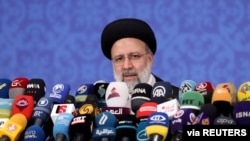Ultraconservative Ebrahim Raisi is to be inaugurated Tuesday as the new president of Iran, a country facing economic and health crises as well as tensions with the West.
He replaces moderate president Hassan Rouhani, whose landmark achievement was the 2015 nuclear deal between Iran and six world powers.
From the outset, Raisi will have to tackle the nuclear talks aimed at reviving the deal from which the United States unilaterally withdrew.
The 60-year-old also faces the United States, Britain and Israel's warnings to Iran over a deadly tanker attack, for which Tehran denies responsibility.
Raisi officially begins his four-year term after his election is endorsed by the Islamic republic's supreme leader, Ayatollah Ali Khamenei.
Raisi won a presidential poll in June in which more than half the electorate stayed away after many political heavyweights were barred from standing.
A former judiciary chief, Raisi has been criticized by the West for his human rights record.
The inauguration ceremony is to be held at 10:30 am (0600 GMT) at the supreme leader's offices in central Tehran, according to state media.
Traffic limitations are planned on streets around the venue with domestic air travel to and from the capital banned for two hours until noon, media reports said.
On Thursday, Raisi will be sworn in before parliament where he is to submit his proposed government list.
Economy - top challenge
Raisi's presidency will consolidate power in the hands of conservatives following their 2020 legislative election victory, marked by the disqualification of thousands of reformist or moderate candidates.
On July 27, he called on parliament for "cooperation" to increase Iranians' hope in the future. "I am very hopeful for the country's future and confident that it is possible to overcome difficulties and limitations," he said in a statement issued by his office.
Iran's economic woes, exacerbated by U.S. sanctions, will be the new president's top challenge, according to Clement Therme, a researcher at the European University Institute in Italy.
"His main objective will be to improve the economic situation by reinforcing the Islamic republic's economic relations with neighboring countries," and others such as Russia and China, Therme told AFP.
The 2015 deal saw Iran accept curbs on its nuclear capabilities in return for an easing of sanctions.
But former U.S. President Donald Trump withdrew from the accord three years later and ramped up sanctions again, prompting Tehran to pull back from most of its nuclear commitments.
Trump's successor Joe Biden has signaled his readiness to return to the deal and engaged in indirect negotiations with Iran alongside formal talks with the accord's remaining parties — Britain, China, France, Germany and Russia.
The US sanctions have choked Iran, including by seeking to stop its oil exports, and the economy contracted by more than 6% in both 2018 and 2019.
US warns of 'appropriate response'
In the winter of 2017-2018, and again in 2019, street protests sparked by the economic crisis rocked the country.
And last month, demonstrators in oil-rich Khuzestan province, which has been hit by drought, protested in the streets to vent their anger.
On the foreign front, tensions have escalated after the United States and Britain joined Israel in blaming Tehran for a tanker attack off Oman last Thursday that killed a British security guard and a Romanian crew member.
The United States vowed an "appropriate response," while Iran warned Monday it will respond to any "adventurism."
The economic malaise has been exacerbated by the coronavirus pandemic, which has officially cost more than 90,000 lives and also hit many Iranians financially.
In his final cabinet meeting Sunday, Rouhani defended his track record but apologized over the "hardships" Iranians have had to endure.
After his election, Raisi made clear that his key foreign policy would be to improve ties with regional countries.
In mid-July, Rouhani said he hoped his successor can clinch a deal to lift U.S. sanctions and conclude nuclear talks.
But Khamenei, whose word is final in policy matters, has warned against trusting the West.
Raisi already has said he will not hold talks simply for the sake of negotiations.
His government will only support talks that "guarantee national interests," the incoming president said.
Six rounds of nuclear talks between Iran and world powers were held in Vienna between April and June.
The last round concluded on June 20, and no date has been set for a resumption.




